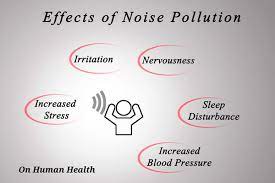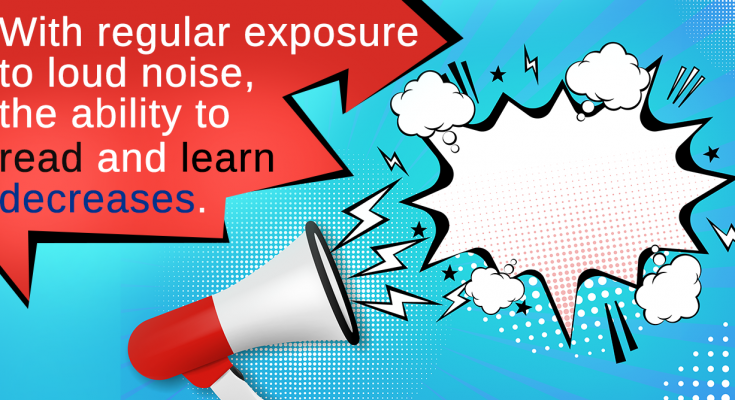Table of Contents
Essay on Noise Pollution – 1500 words
Imagine the following: You are trying to study for an important exam, but you can not concentrate because of the booming music from your neighbour’s party. You try to drown out the noise with headphones, but it’s no use. Frustrated and sleep-deprived, you give up and resign yourself to a sleepless night. Unfortunately, this scenario is not uncommon in today’s world where noise pollution has become a pervasive and often overlooked problem. Whether it is the constant hum of traffic or the never-ending roar of construction work, noise pollution has a significant impact on our health, well-being and quality of life. In this essay, we will explore the causes and effects of noise pollution and discuss possible solutions to this growing problem.
Causes of Noise Pollution
Noise pollution is a pervasive problem that affects us all. From the roar of traffic to the clang of construction work, noise pollution is ubiquitous and can have serious consequences on our health and well-being. In this part of the essay, we will explore the main causes of noise pollution, from traffic noise to the cacophony of domestic life. So get ready for a journey through the noisy world of noise pollution.
Traffic noise
One of the most common sources of noise pollution is traffic, such as cars, trucks, trains and planes. Imagine living next to a busy highway, where cars and lorries thundering past, honking and braking at all times of the day and night. Or imagine trying to sleep in an aeroplane with the engines roaring loudly in your ears. Besides the noise itself, traffic noise can also cause vibrations that can damage buildings and infrastructure.
Industrial noise
Another major contributor to noise pollution is industry, such as factories, power plants and construction sites. For example, imagine working in a factory where the machines whir and clang at high decibel levels, making it difficult to hear your colleagues or even your own thoughts. Or imagine living near a construction site where heavy machinery pounds the ground and drills into concrete, so that your windows are shaken and your nerves are on edge.
Construction noise
Construction noise is a subset of industrial noise, but it deserves its own category because it is often temporary and can be particularly disruptive to residents. Whether a new building is being constructed or an old one is being renovated, construction noise can last for weeks or even months, making it difficult to sleep, work or relax at home.
Recreational noise
Recreational noise, while not as widespread as traffic or industrial noise, can also be a source of noise pollution. This includes loud music at concerts or clubs, fireworks and even garden parties. Imagine you want to spend a quiet evening at home and then you are disturbed by your neighbour’s loud party next door. Or imagine living near a stadium where fans are cheering and shouting at the top of their voices during a match.
Domestic noise
Finally, domestic noise refers to sounds generated inside the home, such as from appliances, electronics and even people. For example, imagine living in an flat building where your upstairs neighbour is stomping around in high heels or playing music at all hours of the night. Or imagine trying to concentrate on your work while your flatmate is talking loudly on the phone or playing video games with the volume turned up. Even though domestic noise is not as loud as some of the other sources of pollution, it can still have a significant impact on our daily lives.
Effects of Noise Pollution

Silence may be golden, but in today’s noisy world it is becoming increasingly rare. Whether it’s traffic, construction work or noisy neighbours, noise pollution is a growing problem that affects us all. But what are the real effects of all that noise? In this part of the essay, we will explore the main effects of noise pollution, from the physical damage it can do to our health, to the psychological toll it can take on us, to its disruptive effects on communication and work, and even its impact on wildlife. So sit back, relax and let the power of silence inspire you.
Effects on health
Noise pollution is not only annoying, it can also have serious health consequences. For example, imagine living next to a busy motorway where the constant noise and vibrations affect your sleep patterns, increase your stress levels and even raise your blood pressure. Over time, this can lead to a range of health problems, including heart disease, strokes and insomnia. In addition, loud noise can damage our hearing and lead to permanent hearing loss or tinnitus.
Psychological effects
Noise pollution can also have a significant impact on our psychological health and well-being. For example, imagine trying to work or study in a noisy environment where you cannot concentrate or think clearly. This can lead to frustration, anxiety and even depression. In addition, noise pollution can affect our mood and make us more irritable and less patient with others.
Interference with communication and work
Another effect of noise pollution is that it can interfere with communication and work. For example, imagine trying to talk to someone in a noisy restaurant and having to shout to be heard. Or imagine working in an open-plan office where you can hear every phone call and conversation around you. This can lead to misunderstandings, mistakes and reduced productivity.
Impact on wildlife
Finally, do not forget that noise pollution does not just affect people, it can also have a significant impact on wildlife. For example, imagine living near an airport with planes roaring overhead day and night, disturbing the natural habitat of birds and other animals. This can affect their behaviour, migration and even their ability to mate and reproduce. In addition, underwater noise pollution can also harm marine life such as whales and dolphins by impairing their communication and echolocation abilities.
Prevention and control of noise pollution
As we have seen, noise pollution can have serious effects on our health and well-being, as well as on the environment around us. However, the good news is that there are a variety of methods we can use to prevent and control noise pollution. From careful planning and zoning to the use of noise barriers, regulating noise levels and raising awareness through education, we have many tools at our disposal to make our world a quieter, more peaceful place. So let us dive into the world of noise abatement and explore some effective strategies to combat noise pollution.
Planning and zoning
One of the most effective ways to prevent noise pollution is through careful planning and zoning. This involves planning buildings, roads and other structures to minimise noise pollution and prevent noise from spilling over into neighbouring areas. For example, urban planners can create “quiet zones” in residential areas by limiting the number of noise-producing activities allowed in those areas, e.g. by banning loud concerts or sporting events.
Noise barriers
Another way to control noise pollution is to use noise barriers. These barriers are physical structures designed to block or absorb sound waves. They can be used to reduce noise levels in areas with high traffic volumes, for example along motorways or near airports. For example, a noise barrier made of concrete, wood or other sound-absorbing materials can help reduce noise pollution for residents living near a busy road or railway tracks.
Regulating noise levels
Governments can also regulate noise levels to prevent and control noise pollution. This may involve setting noise limits for different types of activities, such as construction, transport or industrial activities. In some cities, for example, noise levels from construction sites are restricted to certain times of the day to prevent noise pollution for residents.
Education and awareness
Finally, educating the public about the negative effects of noise pollution and how to avoid it can be an effective way to control noise pollution. In schools, for example, students can be educated about the importance of reducing noise levels and wearing hearing protection to prevent hearing damage. Public campaigns can also raise awareness of the impact of noise pollution on health and encourage people to take action to reduce noise levels, for example by turning down their music or using quieter equipment.
So we have learned a lot about noise pollution – from its causes and effects to the various ways we can prevent and control it. But let us face it, we all love a little noise from time to time, don’t we? I mean, who does not like to turn up the volume on their favourite song or cheer on their team at a sporting event?
But here’s the thing: Too much of a good thing can be bad for us. Just as eating too much ice cream or watching too much TV can have negative consequences, too much noise can be detrimental to our health and well-being.
So let us all pledge to be a little quieter, be a little more considerate of our neighbours and be aware of the effects of noise pollution. Maybe we can even start a new trend – “quiet parties” where we can all enjoy each other’s company without shouting over the music. Who knows, maybe this will catch on and we’ll all be a little happier and healthier as a result.
Ultimately, it’s up to all of us to make our world a little quieter, more peaceful and more enjoyable. So let us turn down the volume, listen to the sounds of silence and make some noise for a healthier and happier world.
Essay on Noise Pollution 150- 200 Words
If you have ever been stuck in a traffic jam, you know how frustrating it can be. But did you know that traffic can also be a major source of noise pollution? That’s right, the noise of honking cars and screeching tyres can have a negative impact on your health and well-being.
But traffic is not the only culprit when it comes to noise pollution. Construction sites can also be a source of loud and persistent noise that can disturb your peace. And do not even get us started on the noisy neighbours and their booming music!
So what can you do about noise pollution? Well, there are various strategies to reduce noise pollution, such as traffic calming measures, sound barriers and the use of quieter equipment on construction sites.
But why should we care about noise pollution at all? Because it can have serious health consequences, including hearing loss, sleep disturbance and stress. So let us all do our part to reduce noise pollution and create a more peaceful and healthier environment for ourselves and those around us.
Essay on Noise Pollution 250 – 300 Words
We all love a good beat or a loud cheer, but what about the not-so-great noises that fill our daily lives? Noise pollution is a growing problem that can affect our quality of life and even our health.
From traffic to construction sites, noise pollution can come from a variety of sources. Have you ever had to shout over honking cars or blaring music just to have a conversation? That’s noise pollution, and it can lead to hearing loss, sleep disturbance and stress. No one wants that!
Fortunately, there are ways to reduce noise pollution and create a more peaceful environment. Traffic calming measures such as speed limits and sound barriers can help reduce noise from cars and trucks, while quieter equipment and scheduling work at less busy times can help reduce noise from construction sites.
But what can you do as an individual to reduce noise pollution? Well, you can start by using noise-cancelling headphones or earplugs in noisy environments. Keeping music and TV at a reasonable volume can also help reduce noise pollution in residential areas. And if you live near a busy road or a construction site, you can plant trees or put up sound-absorbing curtains to reduce noise pollution in your home.
Why is it important to reduce noise pollution? Well, because it can have serious effects on our health and well-being. No one wants to lose their hearing or suffer from lack of sleep, and chronic stress caused by noise pollution can have negative effects on our physical and mental health.
In summary, noise pollution may not be the funniest issue, but it is an important one. If we take action to reduce noise pollution in our communities and in our own lives, we can create a more peaceful and healthier environment for all. So let us turn down the noise pollution and enjoy the sweet sounds of a quieter world.
Also Check – Essay on Air Pollution in India- Current Challenges and Future Strategies
Also Check – Essay of Soil Pollution
Also Check – Essay on Air Pollution
Also Check – Also Check – What is the Carbon Footprint in Simple Words? – A Guide for Young Minds
Also Check – Global Warming and Climate Change Essays- Innovative Perspectives and Solutions
Also Check – Essays on Save Earth- 3 Diverse Approaches to Environmental Preservation



